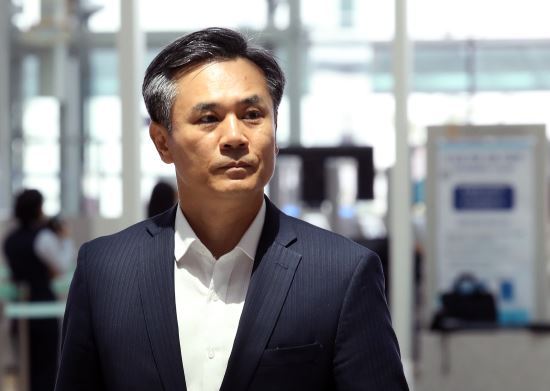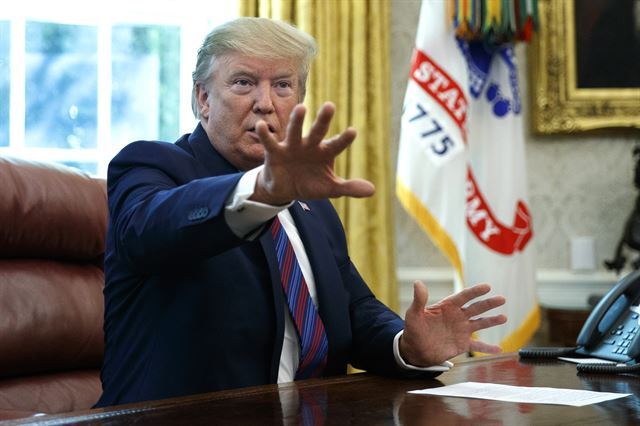South Korea beset by escalating trade tensions
Korean agricultural sector may be hit by US moves to press WTO
By Shin Ji-hyePublished : July 29, 2019 - 16:05
South Korea faces economic disruption as Japan moves to tighten export curbs on materials necessary for local tech frms, along with fresh objections raised by the US that could hurt the domestic agricultural sector.
Japan is likely to remove Korea from a whitelist of 27 countries that receive preferential treatment in trade after a Cabinet meeting Friday, major Japanese media outlets reported Monday.
Tokyo gathered public opinion on its decision to remove Korea from the whitelist last week. A majority of some 40,000 respondents are reported to be in favor of a revision of the presidential decree that will enforce the decision.
Korea is among the countries that enjoy preference in customs clearance from Japan, and is recognized as having an advanced export control system. If the law is revised, it will become the first country to be removed from the list. In other words, Japanese companies need to get separate approval each time they export 1,115 parts and materials that are categorized as being capable of being used for developing weapons.
Japan is likely to remove Korea from a whitelist of 27 countries that receive preferential treatment in trade after a Cabinet meeting Friday, major Japanese media outlets reported Monday.
Tokyo gathered public opinion on its decision to remove Korea from the whitelist last week. A majority of some 40,000 respondents are reported to be in favor of a revision of the presidential decree that will enforce the decision.
Korea is among the countries that enjoy preference in customs clearance from Japan, and is recognized as having an advanced export control system. If the law is revised, it will become the first country to be removed from the list. In other words, Japanese companies need to get separate approval each time they export 1,115 parts and materials that are categorized as being capable of being used for developing weapons.

Japan is also reportedly considering including carbon fiber, a key ingredient in fiber-reinforced plastics and other composites, in the list of items subject to the whitelist.
Although local firm Hyosung has recently developed the original technology, Japanese firms Toray, Toho-Tenax and Mitsubishi Rayon dominate the market with around 70 percent share.
Viewing Japan’s export curbs as political retaliation, Korea is preparing to approach the World Trade Organization’s Dispute Settlement Body.
“We have received unofficial support from WTO member nations,” said Kim Seung-ho, deputy minister for multilateral and legal affairs.
He recently returned from the WTO General Council meeting in Geneva where he strongly urged Japan to retract its export curbs, arguing that Tokyo is using trade as a political tool to disrupt bilateral economic relations.
Adding fuel to fire, Korea faces fresh trade concerns raised by the US.
On Friday, President Donald Trump said dozens of rich countries, including Korea, abuse trade rules to get preferential treatment.

He tweeted that some of the world’s richest countries claim to be developing countries “to avoid WTO rules and get special treatment.” He also said he had directed “the US trade representative to take action” so that countries stop cheating the system at the expense of the US. Adding that the US would “use all available means” to secure changes to a provision at the WTO.
The denouncement apparently targets China, but the move may affect Korea’s agricultural sector. It was categorized as a developing country in 1996 and still maintains the status to protect its agricultural sector.
The US is calling for a status change of some countries in the WTO by presenting four standards, including whether they are a member nation of the Organization for Economic Cooperation and Development and Group of 20. The standards also include a nation with over $12,056 in per capita income and with a portion of more than 0.5 percent of global trade volume. Korea meets all the criteria.
However, it is not easy to change the WTO rules because the US has to get approval from the 164 member nations, said Chung In-gyo, a professor at Inha University’s international trade college.
But if Korea is not considered a developing country and is categorized as an “advanced country,” its agricultural sector is expected to be hit hard, as it would have to face further cuts in tariffs and subsidies.
The trade disputes raised by Japan and the US may be a dilemma for Korea, according to Ahn Duk-geun, a professor at Seoul National University’s Graduate School of International Studies.
“It may have to choose whether to confront the issue with the US fiercely or to quietly accept it to draw its support over Japan’s export restrictions,” he said.
Trade Minister Yoo Myung-hee, who returned Saturday after meeting US politicians, think tanks and trade associations in Washington, said the US side shared a consensus that Japan’s export curbs should immediately be withdrawn.
Commerce Secretary Wilbur Ross was quoted by the ministry as saying he fully shared the view that Japan’s export restrictions may end up disrupting the global supply chain and vowed to “make efforts” for the prompt settlement of the trade dispute.
According to a WTO report titled “Potential Economic Effects of a Global Trade Conflict,” released in April, the escalation of global trade tensions may drive down the global economic growth by 1.96 percent in 2022. Korea would be the second-worst hit, following Association of Southeast Asian Nations, with a reduction of real growth by 3.34 percent.
By Shin Ji-hye (shinjh@heraldcorp.com)


![[Exclusive] Korean military set to ban iPhones over 'security' concerns](http://res.heraldm.com/phpwas/restmb_idxmake.php?idx=644&simg=/content/image/2024/04/23/20240423050599_0.jpg&u=20240423183955)

![[Graphic News] 77% of young Koreans still financially dependent](http://res.heraldm.com/phpwas/restmb_idxmake.php?idx=644&simg=/content/image/2024/04/22/20240422050762_0.gif&u=)



![[Pressure points] Leggings in public: Fashion statement or social faux pas?](http://res.heraldm.com/phpwas/restmb_idxmake.php?idx=644&simg=/content/image/2024/04/23/20240423050669_0.jpg&u=)










